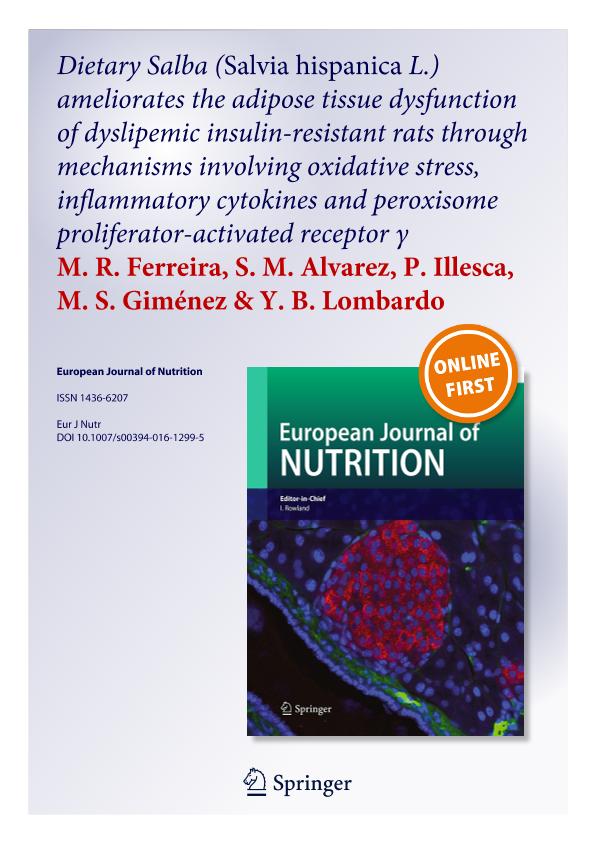Artículo
Dietary Salba (Salvia hispanica L.) ameliorates the adipose tissue dysfunction of dyslipemic insulin-resistant rats through mechanisms involving oxidative stress, inflammatory cytokines and peroxisome proliferator-activated receptor γ
Ferreira Cordoneda, Maria del Rosario ; Alvarez, Silvina Monica
; Alvarez, Silvina Monica ; Illesca, Paola Guadalupe
; Illesca, Paola Guadalupe ; Gimenez, Maria Sofia
; Gimenez, Maria Sofia ; Bolzon, Yolanda Ana Rosa
; Bolzon, Yolanda Ana Rosa
 ; Alvarez, Silvina Monica
; Alvarez, Silvina Monica ; Illesca, Paola Guadalupe
; Illesca, Paola Guadalupe ; Gimenez, Maria Sofia
; Gimenez, Maria Sofia ; Bolzon, Yolanda Ana Rosa
; Bolzon, Yolanda Ana Rosa
Fecha de publicación:
02/2018
Editorial:
Springer
Revista:
European Journal of Nutrition
ISSN:
1436-6207
Idioma:
Inglés
Tipo de recurso:
Artículo publicado
Clasificación temática:
Resumen
Purpose: Rats fed a long-term sucrose-rich diet (SRD) developed adipose tissue dysfunction. In the adipose tissue of these SRD-fed rats, the present study analyzed the possible beneficial effects of dietary Salba (chia) seeds in improving or reversing the depletion of antioxidant defenses, changes in pro-inflammatory cytokines and ROS production. Methods: Wistar rats were fed a SRD for 3 months. After that, half of the animals continued with the SRD until month 6, while in the other half, corn oil was replaced by chia seeds for 3 months (SRD + chia). A reference group consumed a control diet all the time. Results: Compared with the SRD-fed rats, the animals fed a SRD + chia showed a reduction in epididymal fat pad weight; the activities of antioxidant enzymes CAT, SOD and GPx returned to control values, while GR significantly improved; mRNA GPx increased, and both mRNA SOD and the redox state of glutathione returned to control values; a significant increase in the expression of Nrf2 was recorded. These results were accompanied by a decrease in XO activity and ROS contents as well as plasma IL-6 and TNF-α levels. Chia seeds reversed the decrease in PPARγ protein mass level and increased the n-3/n-6 fatty acids ratio of membrane phospholipids. Besides, dyslipidemia and insulin sensitivity were normalized. Conclusion: This study provides new information concerning some mechanisms related to the beneficial effects of dietary chia seeds in reversing adipose tissue oxidative stress and improving the adipose tissue dysfunction induced by a SRD.
Archivos asociados
Licencia
Identificadores
Colecciones
Articulos(CCT - SANTA FE)
Articulos de CTRO.CIENTIFICO TECNOL.CONICET - SANTA FE
Articulos de CTRO.CIENTIFICO TECNOL.CONICET - SANTA FE
Articulos(IMIBIO-SL)
Articulos de INST. MULTIDICIPLINARIO DE INV. BIO. DE SAN LUIS
Articulos de INST. MULTIDICIPLINARIO DE INV. BIO. DE SAN LUIS
Citación
Ferreira Cordoneda, Maria del Rosario; Alvarez, Silvina Monica; Illesca, Paola Guadalupe; Gimenez, Maria Sofia; Bolzon, Yolanda Ana Rosa; Dietary Salba (Salvia hispanica L.) ameliorates the adipose tissue dysfunction of dyslipemic insulin-resistant rats through mechanisms involving oxidative stress, inflammatory cytokines and peroxisome proliferator-activated receptor γ; Springer; European Journal of Nutrition; 57; 1; 2-2018; 83-94
Compartir
Altmétricas



